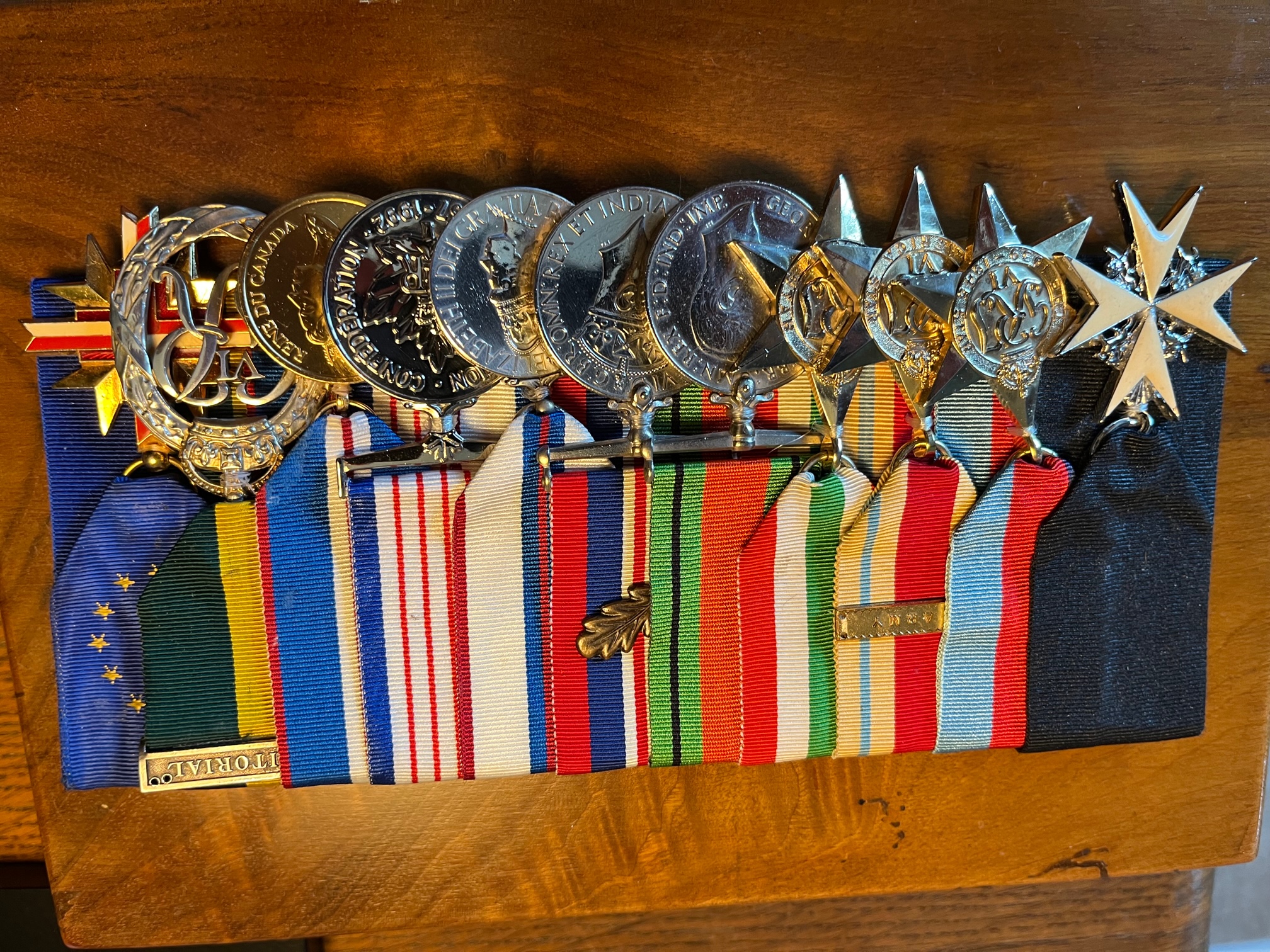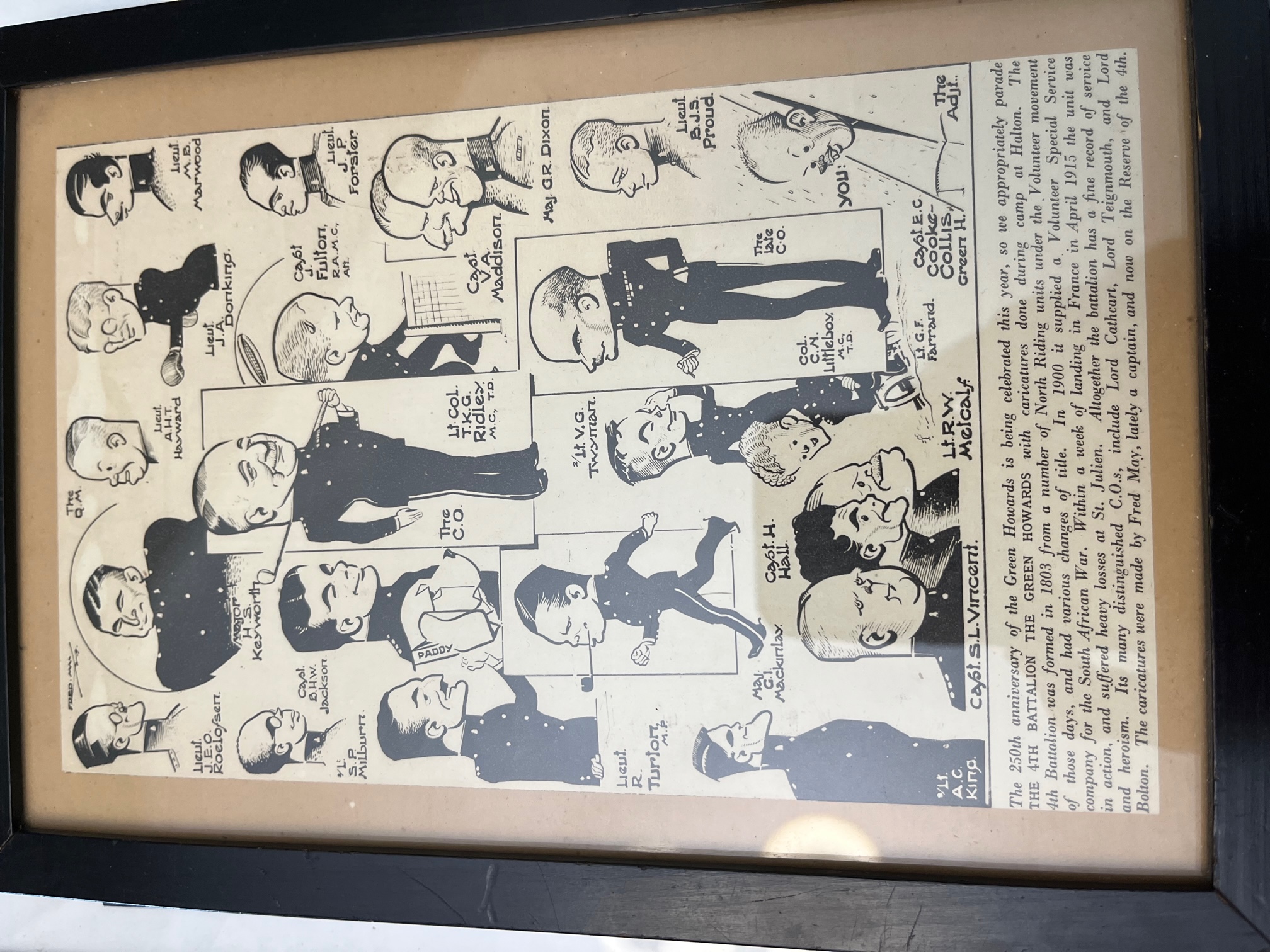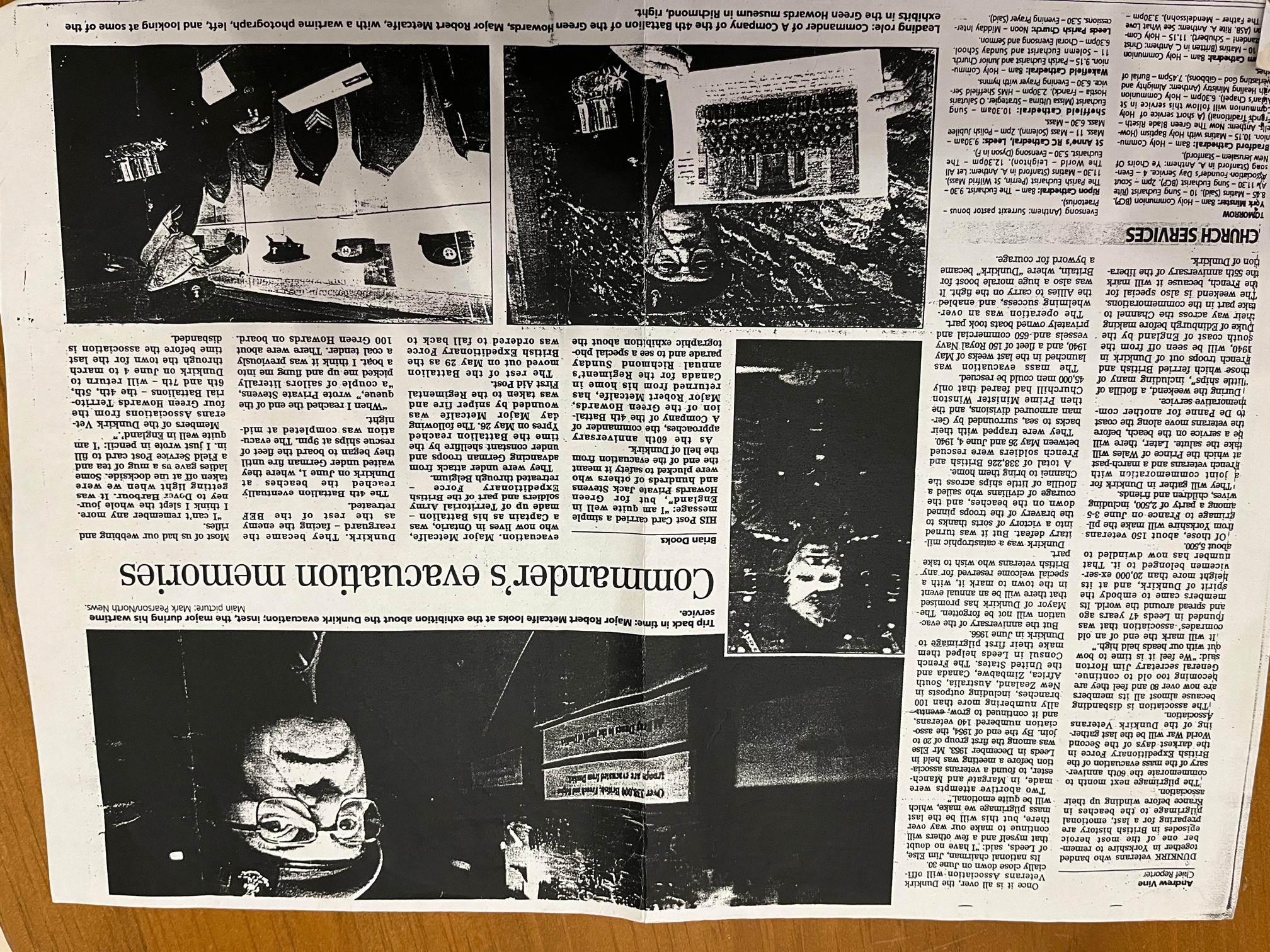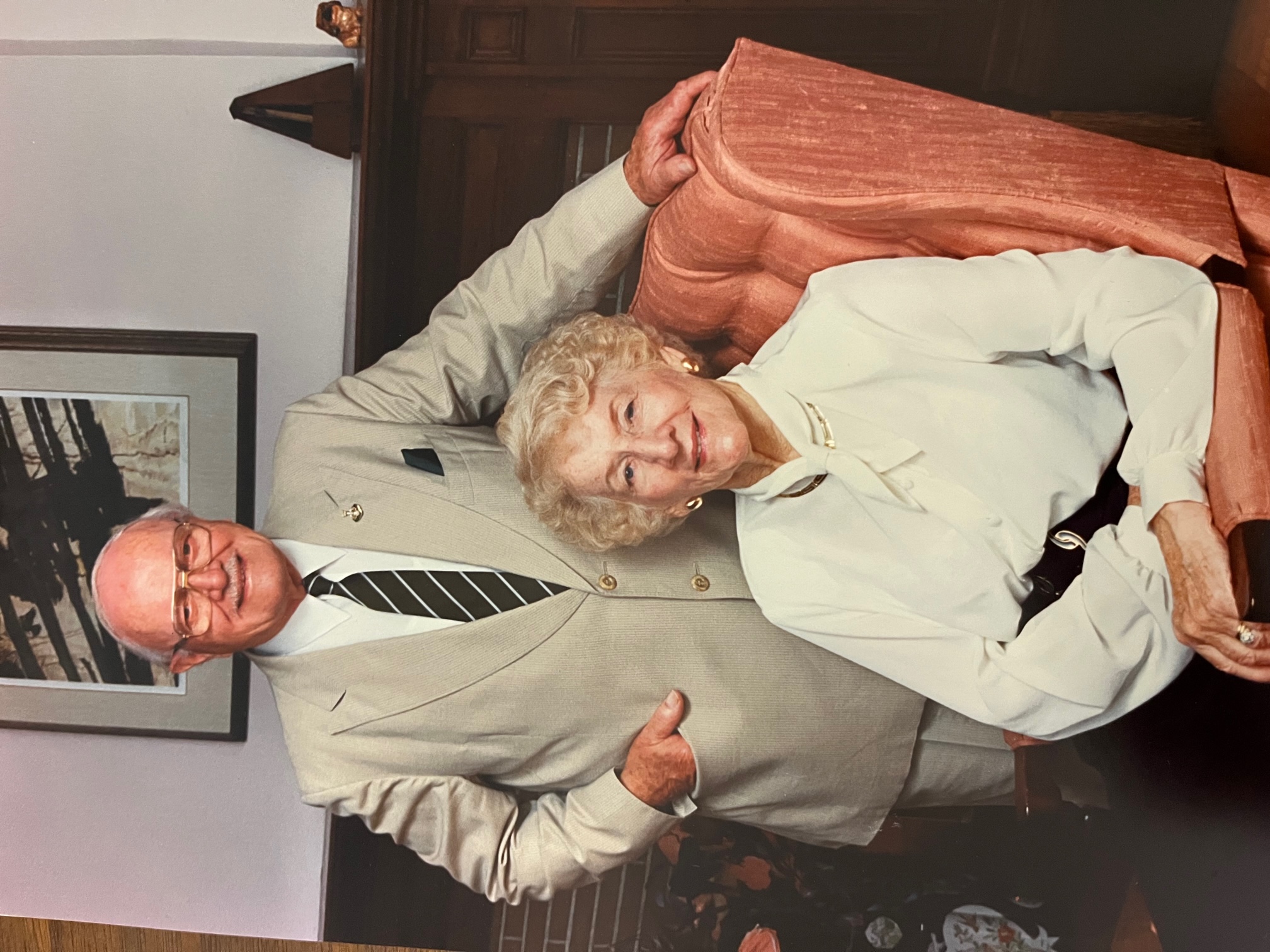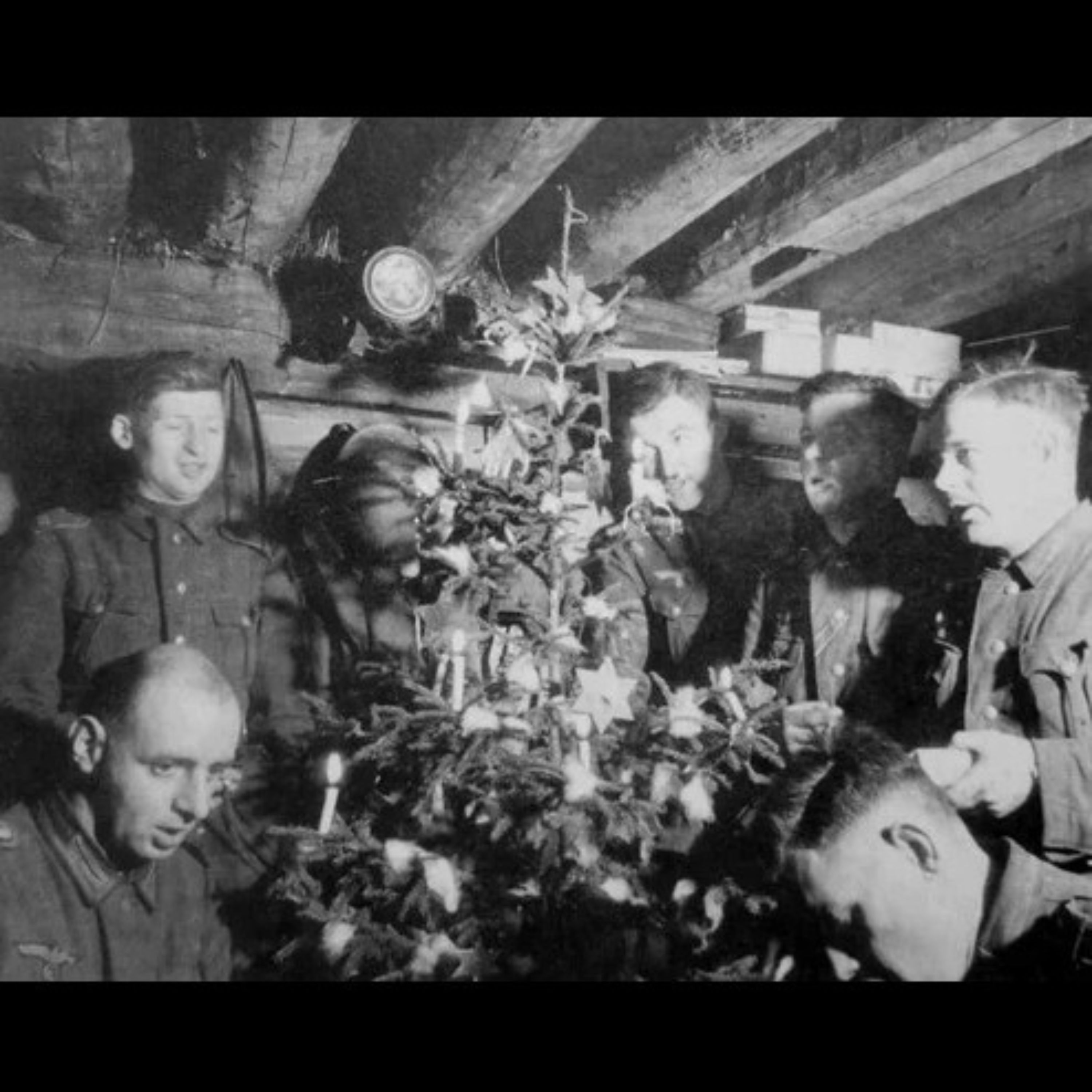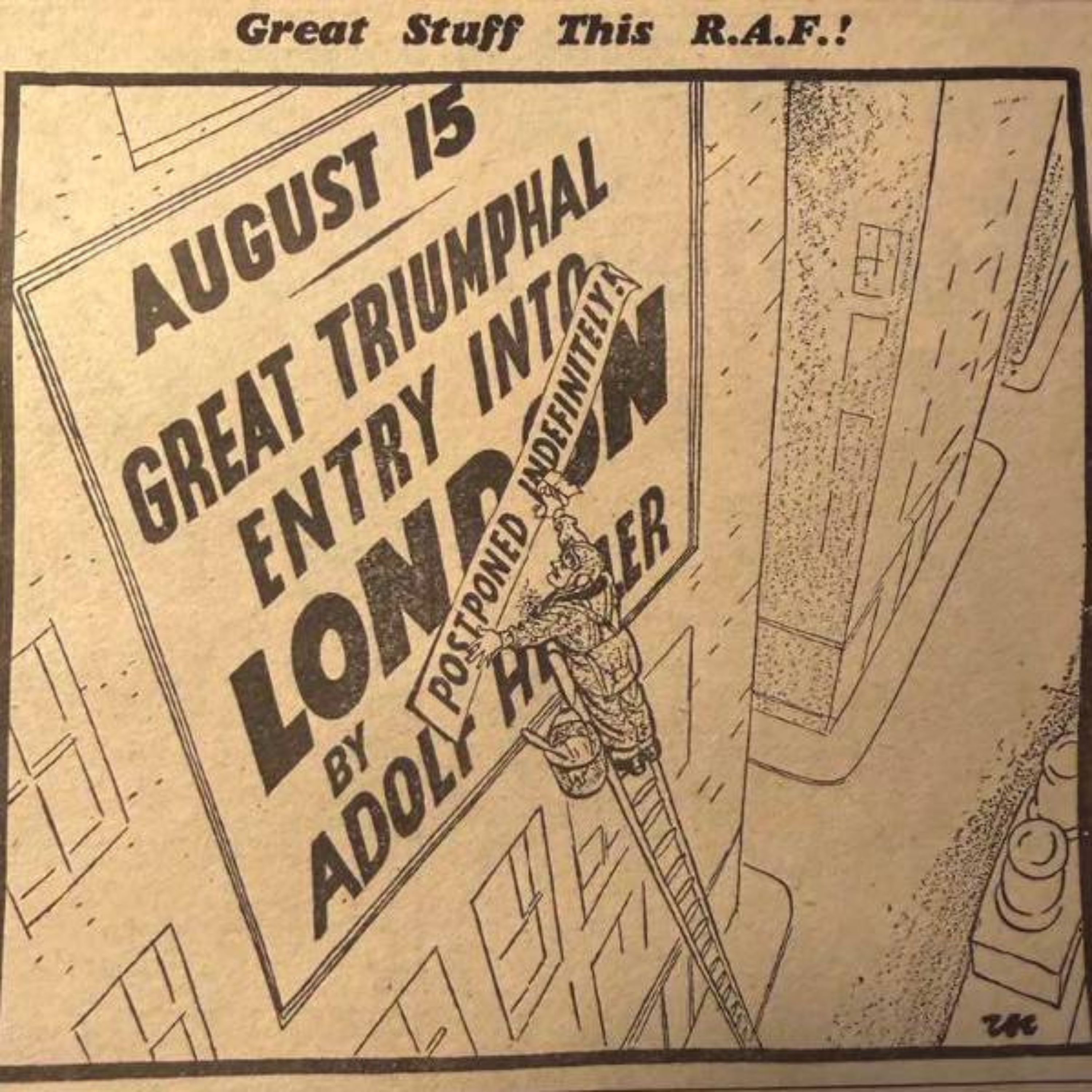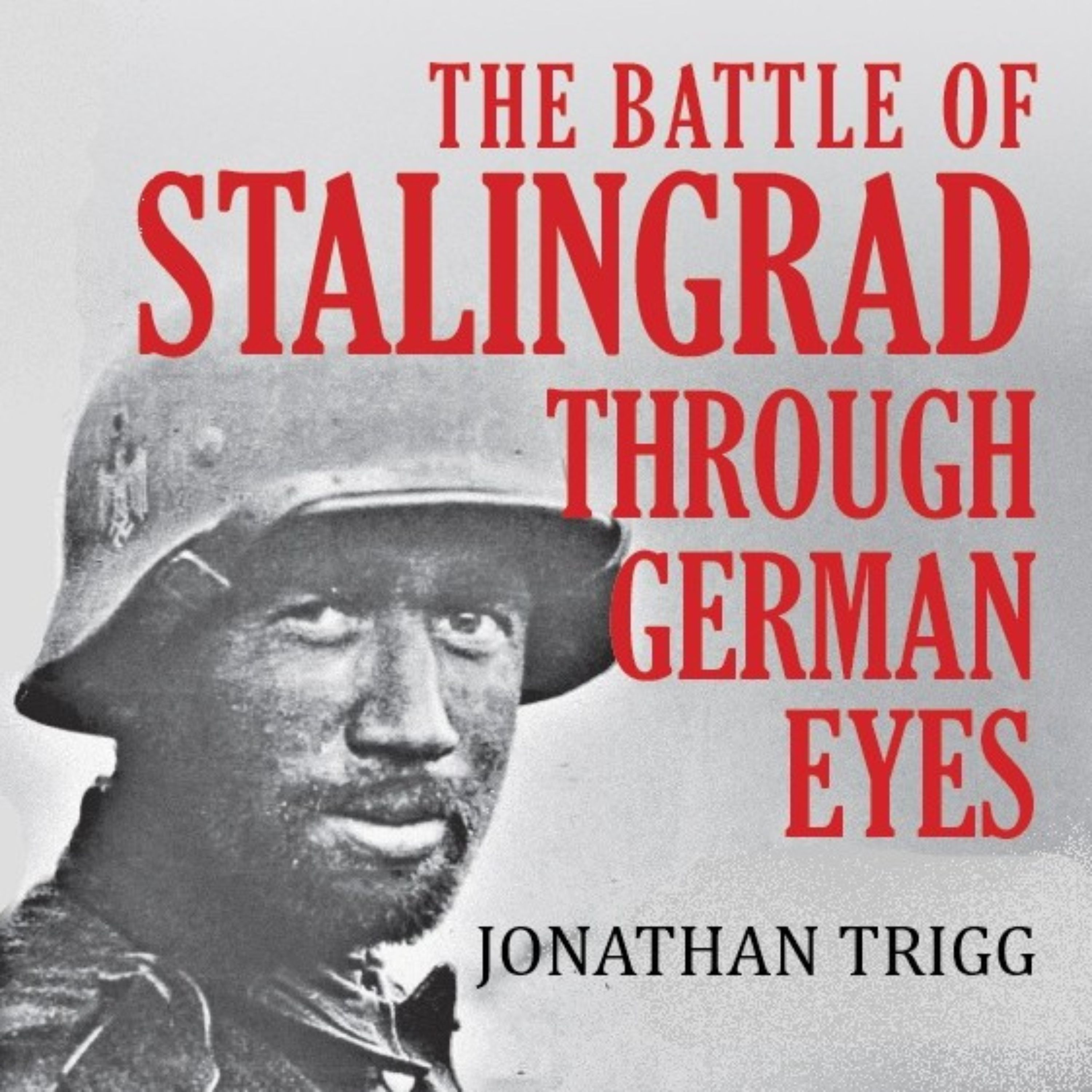94 Dunkirk Special PART ONE - Bob Metcalfe British Canadian, Green Howard WW2 history
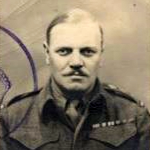
Featuring No time for dreams: a soldier’s six-year journey through World War II. By Robert W. Metcalfe, 4th Green Howards Bob Metcalf enlisted in the fourth battalion, the Green Howards in December 1935. He saw action in France in 1940, where...
Featuring No time for dreams: a soldier’s six-year journey through World War II.
By Robert W. Metcalfe, 4th Green Howards
Bob Metcalf enlisted in the fourth battalion, the Green Howards in December 1935. He saw action in France in 1940, where he was wounded. Subsequently, he served with the sixth battalion, the Green Howards, and the western desert, in Sicily, and was part of a British increment that fought with the fifth United States Army in Italy. After the war, Bob lived in Canada and became a Canadian citizen. He wrote his memoir in the early 1970’s.
Plus loads of family stories!
More great unpublished history of world war two!
Full show notes, photos and transcript at:
https://www.fightingthroughpodcast.co.uk/94-Dunkirk-Special-Bob-Metcalf-Brit-Canadian-Green-Howard-WW2-history
Reviews on main website:
https://www.fightingthroughpodcast.co.uk/reviews/new/
Apple reviews: https://itunes.apple.com/gb/podcast/ww2-fighting-through-from-dunkirk-to-hamburg-war-diary/id624581457?mt=2
Follow me on Twitter:
https://twitter.com/PaulCheall
Follow me on Facebook:
https://www.facebook.com/FightingThroughPodcast
YouTube Channel:
https://www.youtube.com/channel/UCnlqRO9MdFBUrKM6ExEOzVQ?view_as=subscriber
Buy Me a Coffee:
https://www.buymeacoffee.com/fightingthrough
Patreon:
https://www.patreon.com/FightingThrough
Links to features in the show:
France and Flanders – The Scotsmen story
https://m.facebook.com/story.php?story_fbid=pfbid0rqsd4pF1fs37YC76TPuVgh4tpudaa3Lu7nHhMMX71WGSMQo2rnJ7Vu8eJ6hADWuFl&id=100072081056641
D-Day Operation Overlord facebook page
https://www.facebook.com/groups/1528243384106448/permalink/3551589835105116/
Assn of Dunkirk ships
https://www.facebook.com/DunkirkShips/https://www.adls.org.uk/
https://www.facebook.com/culturevannin/photos/a.421476987984802/2655215381277607/?type=3
Isle of Man Culture Vannin Facebook page
for the Manx Heritage foundation: taking Manx culture forward
https://culturevannin.im/watchlisten/videos/world-war-two--the-isle-of-man-411483/?fbclid=IwAR1DGg6OnFOGCNd1evVKIBIUuliCuwI7vT-v5xDUcN44-bE5hSJ-kG1myjI
Reddit Stories about WW2 heroes. Sgt Carbonero:
https://reddit.com/r/ww2/s/7zhCVvj7sr
Friends of Normanby Village Facebook page – 4th Green Howard story. Albert Edward Mead.
https://www.facebook.com/groups/614763812894288/posts/1047674802936518/?comment_id=1047749999595665&reply_comment_id=1047877976249534¬if_id=1699710094723212¬if_t=group_comment_mention
Interested in Bill Cheall's book? Link here for more information.
Fighting Through from Dunkirk to Hamburg, hardback, paperback and Kindle etc.
Fighting Through Podcast WW2 history Episode 94.
Dunkirk Special with Bob Metcalf Brit Canadian, Green Howard WW2 history
More great unpublished history!
Bob's Medals
Green Howard caricatures. Bob on bottom row, also see Cooke Cullis.jpg
News clipping of Bob's adventures WW2 history
Bob Metcalfe Dunkirk veteran and wife Helen
This is a top ww2 podcast. Fighting through is a regularly recommended WWII memoirs podcast and a WWII military history podcast
Intro Passage 3 ww2 memoirs
My dad grew up in New Guinea – he once told me a story of when, long after the war had ended, he went for a walk in the jungle and found an old Japanese supply depot - with all the remains!
Intro Passage 4 ww2 history
Seconds before we hit the beach we were hit by a mortar. I was thrown against the side of the craft, and as I pulled myself together, I noticed the Padre fishing about in the scuppers. We had already taken in quite a lot of water and it was blood red.
Intro Passage 5 ww2 history
Our position some way outside of Dunkirk took a direct hit from enemy artillery. My right leg was shattered below the knee, I also had a gunshot wound in my back in the shoulder.
Welcome to this ww2 podcast
Voted one of the best military history podcasts by 5000 regular listeners
This episode of my ww2 history podcast is going to be very special.
Hello again and another warm welcome to Fighting Through WW2 history
I’m Paul Cheall, son of Bill Cheall whose WWII memoirs have been published by Pen and Sword – in FTFDTH.
This podcast features Tanks Lancs yanks,
blitz, Brits,
bombs and beaches, rattles and battles.
Aussies and Canucks.
Tales of yore. Veterans galore.
Scenes where the New Zealand ack ack is going berserk and Bren gunners are on the boil.
Big ships little ships, submarines and sappers!
War games from Captain James.
And Little Savannah waving the banner.
Dunkirk D-Day, Kokoda and Kisses.
Pows, PBIs and pilots.
Japanese and Germans
Interviews and memoirs,
Learn laugh and cry. Have fun chum.
Fighting Through Podcast
Where the real war history is.
There yer go - my new show summary – hope it entertained at least for once
Surprise war story of the week - ww2 podcast
Stanley Allan, a British rating on HMS Windsor was embarking troops off Dunkirk. A file of Scottish soldiers wearing khaki aprons over their kilts and led by an officer with his arm in a sling approached the ship.
'The wounded officer called out to the bridge, "What part of France are you taking us to?" One of the naval officers replied," We're taking you back to Dover". The Scotsmen were disgusted and said “Well, we’re not bloody well coming”.
They promptly turned round and went back to continue the war with the Germans on their own. It really was remarkable.'
That was this month’s surprise opening to the show from France and Flanders – The Scotsmen story – link... From now on I’m going to kick off with similar every episode.
On with the show
Today,
I’ve got a memorable Dunkirk Special with a shipfull of family memoirs and anecdotes, anchored by a terrific fighting memoir by British Canadian Bob Metcalf, sent in by daughter Sue. Bob served with the 4th Green Howards throughout the war and around the globe – so keep yer 18 set tuned in for more from him. [PS tracking lost and found!]
Dunkirk Background
Before I get into the story telling, I’d like to refresh your memories about Dunkirk, famously known for the fighting retreat through France and finally the evacuation from the shores by Fighting ships and ferries, ably supported by the famous flotilla of little ships.
Of course my Dad was evacuated on the Lady of Mann Ferry and you’ll have heard about that in episode one.
The British Expeditionary Force (BEF) moved into France in September 1939, when Britain declared war on Germany for invading Poland. My Dad was there with them, preparing an airfield as part of a labour battalion in the Territorial army reserves of the Green Howards.
On 10 May Hitler had invaded west from Germany through Holland, Belgium and France, forcing the British & French to retreat.
The Dunkirk evacuation ran from 26 May 1940 and on 27th the BEF settled around Dunkirk with half of the French First Army.
Five French Divisions set up roadblocks near Lille, about 50 miles inland. They held out for four days against German Panzer divisions. And this allowed the allies to set up a defensive perimeter and wait for evacuation.
On 4th June the Royal Navy made one last attempt to rescue as many French rearguard as possible.
Later that day the June German forces hoisted the Swastika over the docks.
https://www.facebook.com/DunkirkShips/
https://www.facebook.com/culturevannin/photos/a.421476987984802/2655215381277607/?type=3
And now I’m going to steam straight into a Dunkirk story that’ll get the episode off to an exciting start.
Memoir - The Manxman
Time for a story. This is on the Culture Vannin Facebook page for the [Isle of Man] Manx Heritage foundation – used with their permission.
THE EVACUATION OF DUNKIRK
Tom Corteen
In the evacuation of Dunkirk, I was both mate and second mate of the TSS (Turbine Steamship) Manxman for the whole week. This was because the original mate had had a nervous breakdown on the first run over to Dunkirk. There was quite a lot of action around at the time in Dunkirk so I had everything to see to and organise.
The Manxman did four runs to Dunkirk, and one of them she could not have been credited with, as on arrival off Dunkirk at daylight, the operation was cancelled owing to very heavy shelling. The five other vessels with us were turned back by a destroyer, the Lady of Mann being one of them, but as we were in the lead we were never contacted. This was mainly due to the thick early haze and heavy smoke drifting down over the channel from the burning oil tanks. So we entered the harbour not knowing we were on our own.
It was eerie, steaming in with not a soldier to be seen either on the beaches or on the mole. They had all been pulled back into the town, as there was no shelter from the bursting shells out in the open. There was no officer on the mole to berth us or naval personnel to take our lines. Underneath the mole was packed solidly with soldiers, packed and straddled on the piles, some up to their chins in water, all underneath to keep out of sight and to miss as much of the shrapnel as possible. Some soldiers were washed away on the tide, as there was no room to hang onto the piles above them. They did not understand tides and how the tide swept through the piles of the mole.
We had quite a job to berth alongside, getting soldiers to take two or three turns of a six-inch rope round a pile. Then to hang on to the eye whilst we move alongside until a sailor could jump onto the piles and make us secure. We cut these ropes with a fire axe on leaving.
We embarked every soldier, a very long job as they all had to worm their way along the pile, even from the inner end of the mole. There were shells screaming overhead all the time.
When we arrived off Dover, a destroyer came racing out to intercept us. We had been given up for lost, having been missing all day. There was no one down in Dover to see us berthed, owing to the fact that the evacuation had been cancelled that day. No Army or Naval personnel, no reporters or trains laid on, so the soldiers just lay down on the quay and slept waiting for transport.
How anyone arrived at the numbers carried amazes me, as soldiers came on board at the mole any way they could, and not all by the gangplanks and gangways. Anyway no one was counting, on arrival at Dover they just swarmed ashore - With destroyers landing their troops over us at the same time, just one continuous flood of men pouring ashore. Again some vessels would be in and out of Dunkirk in two or three hours if the troops were there in great numbers. So it was the actual time spent in the place that mattered, not the number of times in and out. The tension would ease every time one was leaving the place as it was in and around Dunkirk where all the action was taking place.
Another day we were on the point of leaving the Mole with a full load of troops after being alongside for about four hours, when some of the crew (who had been standing by to let go) came running to me in a very disturbed state. A destroyer had tied up alongside us and our troops were naturally swarming down on board her. She took nearly all of them, in fact she had to cast off or she would have been over-whelmed.
I told the destroyer commander what I thought about it all - the way he had upset my crew after what they had just been through. They were in and out in minutes and we now had to wait alongside for hours again, awaiting troops who had to be rounded up and sent down the mole to us. No troops were left exposed on the mole unless there was a vessel alongside to receive them.
This destroyer left us, the only vessel in, nothing else even outside the pier heads. We were alone with no protection, not even a pop-gun, not a single tin-hat amongst us, in fact no soldier would even lend me his tin-hat.
At one point I had to go forward to pin the low rudder whilst we were lying alongside - and Hugh Lamps Crennell, the lamp-trimmer (who had been a Lewis gunner in the 1914-1918 war) procured a Lewis gun and ammunition from one of the troops. I helped him to set it up, foreside of the bridge deck and also helped to load it with practically all tracer bullets.
He used that gun a few times before we got away. And he certainly turned a few Stukas off course, I could see bullets passing right through the Stukas and their bombs were falling clear of us. I did not even realise that they were probably machine gunning us as well.
Without that gun, I am sure we would never have got out of Dunkirk. I mentioned this to Admiral Ramsey back in Dover but ‘Lamps’ had cracked up during the passage back and had to be put ashore.
During the early part of the evacuation quite a few soldiers died during the passage, as there were no medical people on board. Some on board were either killed or wounded by their own mates who, once they were aboard, were trying to clean their rifles - and after putting them on deck were pulling the triggers. I made myseld hoarse going around the deck shouting to them to clear the rifles over the side and into the air.
I had not slept for a week, my nerves were keeping me going, then I was relieved by a Naval Officer by Admiral Ramsey, but the evacuation ended that day.
I saw the Mona’s Queen, mined and broken in two, abaft her main mast. We were very close to her, in fact we had just passed over the same spot shortly before. We were then just skimming the tide awaiting a berth at the mole.
We also stopped several times on our passage to pick up soldiers who were tied to row boats, lifeboats across the Channel. These jobs took time, sometimes right in the Dunkirk area,
The last time we left Dunkirk we steamed straight out to sea across all the sand banks because the tide suited, and the East and West buoyed channels were strewn with wrecks. This way we presented a much smaller target for the shell-fire that was taking place.
_______
This is transcribed from 'Old Times / Shenn Traaghyn: From
Recollections and Reminiscences of the past and present Residents of Glenside Residential Home, Douglas, Isle of Man'
This was a book of memories written by residents at Glenside between 1986 & 2006, and published in 2006.
You can find more about the Isle of Man & WW2 at the Culture Vannin Facebook page for the Manx Heritage foundation: taking Manx culture forward
https://www.facebook.com/culturevannin
Just a couple of comments from the Facebook post worth sharing:
Steve Forden
Powerful story. And of course the Ben my Chree was responsible for landing US Rangers on D-day for their famous assault on Pont du Hoc
Joan S.Palmer
My father was on the Mona's Queen at Dunkirk, got out of the Porthole, as well as saving the life of Alf Morgan The Chief Steward by pulling him through the Porthole.
Alf suffered two broken legs and ended up in the Hospital In Liverpool.
Wow – how awful – ----- Liverpool! Sorry – joking - had to be told!
TR
REVIEWS
Podbean reviews
The following people kindly left show reviews on Podbean:
Eric from York in Pennsylvania
Degsey/ Derek
Review – Popeye - More ww2 memoirs
Mike (Popeye) Schoborg wrote in
I am a veteran of the US ARMY, and totally not ashamed to admit I had tears rolling down my cheeks while listening to the JAPANESE DOLL episode. I've been listening to your podcast for several weeks now while driving my semi. I've told several people about this podcast and know that at least 3 of them have given you a listen.
So much respect for your Dad and all the veterans of the greatest generation and the veterans that have fought for what is right and just. Thanks for what you're doing, Mike Schoborg
P.S. For all you do, I give you my "HOW GOOD IS THAT" award. Keep up the good work.
A quick request about Reviews on the pod
If anyone is so disposed, I could rather do with a couple more reviews please on Apple – esp the UK platform. It all helps with search you see, so you’re helping other people find your favourite WWII podcast.
Also there’s a new Spotify episode reviews feature, so if you listen on Spotify please look out for an invitation to leave a comment, if you’ve enjoyed what you heard.
Buy me a few coffees 1 – Gary Young – Second world war history
Buy me a coffee 2 - Derek Degsey Whittle - WW2 history
Thank you guys, all of you
Reddit ww2 memoirs 1
Stories about WW2 heroes.
Sgt Carbonero said:
https://reddit.com/r/ww2/s/7zhCVvj7sr
Years ago as an EMT (Emergency Medical Technician). I transported a lot of vets. I went to pick one guy up and the nurse told me, "Hey treat this guy well he’s a real hero. He single handedly got 50 Germans to surrender".
“Ok!”
So we are transporting and I say to him, "I hear you have a story to tell."
He says, "well, yeah, we were fighting these Germans, and it was towards the end of the war, and I knew a little German from high school, and I yelled over at them, " Hey! we have cigarettes and food! You can either put down your guns and surrender or you can die!!"
And I guess they knew the odds so they all surrendered".
Those vets were so tough, I would go to pick them up and I would ask if they had any aches or pains I should know about. "Naah", they would always say.
I would say "Hey, you are 85 years old, you must have something".
They wou ld finally relent and say, "Well, my shoulder hurts a little" From what? I ask – “[eeeh] Shrapnel from a grenade". He replies.
Man those guys never complained. Tough as nails. RIP heroes.
>TR laugh
There’s more stories like that at a link in the show notes. I’m planning another sniper episode soon and boy have I got another funny story for you with permission from the Sergeant.
Spooky or What
My grandpa was serving in Sicily when he got shot in the leg, fell down, and had a mortar land very close to his head. The doctors pronounced him dead and put him in the dead rows.
The only reason he then survived is because his brother was walking along the dead rows and noticed he was laying there. As he was looking at his brother he realized that he was still breathing.
My grandpa ended up surviving and living into his 60/70s.
Seth Vader on reddit
FAMILY STORIES
I have an absolutely massive number of family stories to share with you today and I’m keen to keep the show moving so here’s one that Merv Williams sent me.
Family story 1- William Basil Lewis Williams
Hello Paul.
Thank you for creating this podcast. It tells in real terms extraordinary tales of supposed ordinary people. I believe my father was one of those people and I have compiled a short document detailing his exploits in the Royal Navy during the Second World War –
Merv Williams
Well, Merv sent me his Dad’s story
I grew up as a typical child of the sixties. An avid watcher of World War 2 films and having a
great fascination for anything military. My bedroom was filled with models of tanks and
battleships and numerous aircraft hanging from the ceiling. When I wasn’t making these
plastic model kits my nose was buried in books and comics such as Victor and Commando.
There were many trips with my like minded friends to the Imperial War Museum a short bus
ride away or more ambitious trips to The Tank Museum in Dorset or The RAF Museum at
Hendon in the summer holidays.
They say that sometimes you don’t see the obvious and I was only to find out the greatest
source of real history was in front of my very eyes - my own father - William Basil Lewis
Williams - affectionately known as Bal.
I grew up as a typical child of the sixties. An avid watcher of World War 2 films and having a
great fascination for anything military. My bedroom was filled with models of tanks and
battleships and numerous aircraft hanging from the ceiling. When I wasn’t making these
plastic model kits my nose was buried in books and comics such as Victor and Commando.
There were many trips with my like minded friends to the Imperial War Museum a short bus
ride away or more ambitious trips to The Tank Museum in Dorset or The RAF Museum at
Hendon in the summer holidays.
They say that sometimes you don’t see the obvious and I was only to find out the greatest
source of real history was in front of my very eyes - my own father - William Basil Lewis
Williams - affectionately known as Bal.
I grew up as a typical child of the sixties. An avid watcher of World War 2 films and having a
great fascination for anything military. My bedroom was filled with models of tanks and
battleships and numerous aircraft hanging from the ceiling. When I wasn’t making these
plastic model kits my nose was buried in books and comics such as Victor and Commando.
There were many trips with my like minded friends to the Imperial War Museum a short bus
ride away or more ambitious trips to The Tank Museum in Dorset or The RAF Museum at
Hendon in the summer holidays.
They say that sometimes you don’t see the obvious and I was only to find out the greatest
source of real history was in front of my very eyes - my own father - William Basil Lewis
Williams - affectionately known as Bal.
I (Merv) grew up as a typical child of the sixties. An avid watcher of World War 2 films and having a great fascination for anything military. My bedroom was filled with models of tanks and battleships and numerous aircraft hanging from the ceiling. When I wasn’t making these plastic model kits my nose was buried in books and comics such as Victor and Commando.
There were many trips with my like minded friends to the Imperial War Museum a short bus ride away or more ambitious trips to The Tank Museum in Dorset or The RAF Museum at Hendon in the summer holidays. They say that sometimes you don’t see the obvious and I was to find out eventually that the greatest source of real history was in front of my very eyes - my own father - William Basil Lewis Williams - affectionately known as Bal.
He was from a small seaside village in rural Pembrokeshire, Wales, and his father served as a naval gunnery officer in The First World War who was Mentioned in Despatches for his accurate surveying of the beaches at Gallipoli and went on to Master ships for the Blue Funnel line after the War.
My father volunteered for the Royal Navy and began his service in May 1942. After initial training he was posted to HMS Drake in Plymouth to train as a Sick Berth Attendant. This was to have a strong significance for him as his only sibling Dewi had also been posted to Drake only to be killed by German bombing in April 1941. Dewi was one of nearly 120 men killed within a three day period.
My father went on to receive further medical training at HMS Assegai in Durban.
One of the few times he mentioned the war was when I was watching The Longest Day on a Saturday afternoon at home. He walked in after his customary lunchtime pint and merely said “I was there” before he walked out.
Another similar episode was when I wanted to watch Tora Tora Tora - my father became visibly upset and swore under his breath before walking out. He was later heard saying to my mother “I hate the Japanese”. This was strange to me as he was a Foreign Exchange Manager at a Japanese merchant bank in the City of London.
Unfortunately he succumbed to his third heart attack, dying at the age of fifty in 1973. I was 13,
He had never heeded the advice of his doctors who told him he must lower his cigarette intake. His smoking started when he was in the Navy and must have helped him cope with the stresses of four years of active service.
It was only then that I started to investigate my father's services having found his medals in an old suitcase. The set of five included The Pacific Star. The Italy Star and The France and Germany Star.
He had served on HMS Fernmoor, a Boom Defence vessel. This ship had been at D-Day having towed a Mulberry Harbour from Scotland thus explaining The France and Germany Star.
Perhaps he thought his war was over after D Day but it was not to be. His ship later joined the British Pacific Fleet who saw heavy action including Kamikaze Attacks in May 1945.
He was demobbed in September 1946 returning home to Wales. He later went on to travel to the Caribbean meeting my mother and moving to London in 1960 where he remained until his death.
My father was a quiet man who never raised his voice to anybody. He had strong moral values and a tremendous inner strength.
Bal passed away nearly fifty years ago but I still think of him every day.
Merv thank you so much for that. And what a great depiction of your Dad’s war. And you’re in good company with most people, including me, who wish they’d asked more questions when their Dads or Mums were still alive. Almost everyone who writes in to the show says the same thing.
Pics in show notes:
My father was William Basil Lewis Williams and he was on the right in the photo with the peaked cap.
Picture of my fathers brother Dewi sadly killed at HMS Drake
Photo of my grandfather Lieutenant David Henry Williams on HMS Bramble.
He is bottom left with the cat on his lap.
In a recent vote by me, the fighting through podcast was voted one of the best military history podcasts
FEEDBACK
Feedback 1 Kevin K USA
This is my fourth time listening thru! Great job!
Family stories 2 Chip Henriss who listens to the show almost daily
I’m the grandson of a German soldier and nephew and great nephew of many others. My family moved to the USA in 1960 and I was born in 1966. I served in the US Marine Corps and then moved to Australia in 1987. I served as an officer in the Australian Army for 10 years.
I love military history and look forward to an audio edition of your father’s book as I never have time to sit and read much and find I can listen to audiobooks while doing other tasks. Do you have any idea when the audio version will be available? Thanks again for your wonderful work.
Here’s a link to my grandfather’s story: https://henriss.wordpress.com/willibald-adhofer-in-the-88thth-inf-div/
I’ve put that link in the show notes
Best regards
Chip Henriss
Melbourne Australia
I just finished the audio book of save the last bullet. My uncle Franz, who is still alive, born in Austria, was 15 years old in the HJ. He was captured by Americans and sent home on a bicycle.
I have a brief story on my mother’s recollections of being a little girl aged 7 when the Russians took her village of Harringsee just east of Vienna. She said they were all hiding in the cellar and that the village was being defended by kids from the HJ.
She remembers vividly one of the boys dying outside of their house and calling for his mother. He is actually in a grave in the cemetery there and I have visited many times. She said when the Russians came they opened the cellar doors and took all the young women out including my grandmother.
The women were all systematically abused. Being a little girl, my mother said she was always treated kindly by the Russians and that lasted throughout the occupation. My father who was also in Vienna at the end of the war told me the same thing.
It has been an interesting life experience growing up in the US and Australia - but having my family history on the losing side of the war. Always growing up with a western perspective of the war yet with a German family connection. My wife is Vietnamese and her father was in the north Vietnamese army and I am fascinated with their family experience as well.
Best regards
Chip
PS Sorry also forgot to mention that I enjoyed your reading of Save the Last Bullet and how you would stop reading and start laughing during the funny bits! I would hope that you are the one who narrates your father’s book.
Chip thanks so much for all that. I'm so pleased you enjoyed the audio book of Save the last Bullet and that you shared my amusement at laughing at the funny bits. I'm working on a Christmas episode of the podcast which will include another extract from Heidis book – but the bloopers I’m preparing on that front will have to wait for the forthcoming 10th anniversary show which I’m curating. And hopefully I'm going to include a few bloopers that no one else on the planet has heard - not even you! In fact not even Heidi who wrote the book.
Regarding an audio version of Dad's book, there's no sign of it on the immediate Horizon but it's going to happen one day whether as a dedicated audiobook or as a series of podcasts - so watch this space. If this advertising works then there’s an increasing chance I’ll be putting the audiobook out free to air on the podcast.
Family stories 3 P Conley
D-Day Operation Overlord facebook page
https://www.facebook.com/groups/1528243384106448/permalink/3551589835105116/
Paul Conley
Following is my Fathers recollection of D Day as a 19 year old on a Landing Craft taking in Commandos during the initial landings.
I came across these letters on a Landing Craft website by chance. His memories came as a surprise to me as he’d ever spoken of them.
LST landing craft Association archive – from the D-Day story, Portsmouth, web site transcription.
Mr H Conley
I was landing craft, signaller H Conley,
P.JX 389121.
I was with the 514 LCA flotilla. Our skipper was lieutenant Burke.
Our carrier ship was the southern railway cross Channel steamer The SS Maid of Orleans,
Skipper captain Payne.
We took number four commando to sword beach with the initial assault (around 7.45-8)
The first thing I can remember is being called from our mess deck (which was below decks, and we could not hear much noise from down there).
We were called up to the next deck to a companion way with a few dim red lights. This was to get our eyes used to the darkness outside. We could hear plenty of gunfire then.
When we got called up to the boat deck, we could see the reason for all the noise. Apart from all the other ships we had one just across on our port beam banging away.
We found out later, this was the monitor The Roberts, banging away with her 16 or 15 inch guns. When we looked towards the beach (which was about 8 miles away) it looked as though the whole of it was on fire. We could also hear a lot of shells coming over. We found out later that these were the German 16 inch guns at Le Havre.
We got into our craft and lowered into the water, then went and picked the commandos up. When we were ready, we formed two lines of three LCA’s then when we got near to the beach, we made lines abreast and went for the beach.
The machine gun, fire and mortar fire was very heavy. Then, seconds before we hit the beach we were hit by a mortar. I was thrown against the side of the craft, and as I pulled myself together, I noticed the commandos’ Padre (who was standing behind me) fishing about in the scuppers. We had already taken in quite a lot of water and this was blood red.
What had happened, was the force of the explosion had blown his false teeth out. He found them and put them straight back in his mouth. By now we were on the beach, so my fellow seamen and myself opened the steel gates and lowered the ramp. The commandos, without any hesitation, were away like greyhounds.
With the commandos gone, we raised the ramp and it was only then that we got a chance to see exactly what had happened. It was not very nice. The mortar had come down right between the second and third commando in the middle row and exploded.
I remember taking my souwester jacket off. And covering them up as best I could. Just behind them a chap had half his hand blown away. My mates and I did this up as best we could. Two others were injured.
We did not have time to do any more as we were taking so much water. We went to the stern to the bilge pump, but somehow a lump of shrapnel had managed to get through and made a hole in the rubber hose so we could not use it.
Luckily enough, we had two buckets and my mate and I bailed out all the way back to the Maid.
We got back on board and made our craft secure, and as I got on the deck, an elderly merchant seaman came over and put his arms round my neck and cried. The tannoy was going, and they were just announcing on the radio that the allies had landed in Normandy. [Listener - proud or what?!]
We went and got ourselves cleaned up and got into dry clothing. Later in the morning, before we started on our way back to Southampton, the skipper spliced the main brace. I was one of the underaged so did not get the ration. But I can assure you, we got plenty of sippers and gulpers from the older lads! [Ha, but old enough to die]
The next day our crew had to go and get a replacement landing craft as ours was holed below and all the rope fender round the outside had been almost shot away.
We went back on the Saturday night and took part of the 51st Highland division over.
Well, that’s about it. Cheerio, all the best.
Henry Conley
Harry!
D-Day Operation Overlord facebook page
https://www.facebook.com/groups/1528243384106448/permalink/3551589835105116/
Family stories 3a Paul Cuthbert Brown
From Paul Cuthbert Brown about his Uncle Geoffrey CB
Also on the excellent D-Day Operation Overlord facebook page
He was on Gold with COBU (Combined operations Bombardment unit)
(directing the allied naval bombardment) from an amphibious (“DD”) Sherman.
And this is the citation for a WW2 medal.
Geoffrey Cuthbert, Brown
140759
Was leftenant, made Captain
This officer was employed as a forward, observer, bombardment in operation, overlord, and proceeded ashore in the early stages to give warship Support to the 50th Northumbrian division.
As his task included the support of an armoured brigade, he was to carry out his duties in a tank, the command of which was also his responsibility. During an engagement with an enemy tank, he was wounded in the eye.
Despite this, he succeeded in destroying the enemy tank, and proceeded to continue with his work as observer for bombarding ships. It was not until he had become temporarily blind, that he allowed his wounds to be attended to.
That was signed by Lieutenant Colonel, GF Sinclair, RA. and also by General Montgomery himself.
Military cross awarded.
Bizarrely, I discovered last year from a photograph published in Tatler in late 1944 that my favourite uncle FRED was Commando trained and was in the same unit as my uncle Geoffrey
His father had been killed virtually on the last day of WW1
Uncle Fred died in the early fifties before my parents met. No reference had ever been made to the two knowing each other, yet my mother’s brother was pictured sitting next to the Lieutenant Colonel (Sinclair) who signed the other uncle’s citation. The latter wasn’t in the picture - possibly still recuperating.
The COBUs get precious little mention in the histories - but those guys were right at the bleeding edge - either
- at the front of the action to see the enemy and call down bombardment
- or behind the enemy (having been inserted prior to D Day - a role it turns out my Uncle Fred was employed on multiple times during North Africa & Italy, and prior to Normandy, where he also was present on D Day.
The link to all this stuff is in the show notes:
D-Day Operation Overlord facebook page
Family stories 4 Wayne grandad ww1 and 2
I’ve got a couple of family stories to share with you from Wayne Howards from Norfolk. His grandad Fred fought in both World War I and World War II.
Years ago, Wayne’s grandad told him that during the Normandy campaign, in France, he was on patrol.
A kid came running out of a bombed out house, waving a gun. He had no uniform but was running towards them.
A few soldiers shouted for him to drop his weapon, but he didn’t and kept running towards them. A couple of soldiers shot above his head, and that had no effect either.
Then Fred said “So I just shot him dead.
The incident haunted me for many years after the war. But it was either him or me as far as I was concerned, and we’d gone through too much to give people the benefit of the doubt.
Fred was in the Manchester regiment, which is where he lived at the time. I’d guess he was in 1st Battalion because their initial post-war role was as occupation troops in Germany. and this fits with Wayne’s second story
Because of Wayne’s grandfather‘s age, he also fought in World War I, so being an older soldier, he was looked upon as a father figure by his comrades. When Germany had surrendered, his regiment were on a patrol ground somewhere in Germany for a special visit from The senior army Commanders or other high ups.
One commander was inspecting the troops and stopped at Fred because he wasn’t carrying a rifle.
When he challenged Fred, he said “I’ve been in two world wars, and I’m not going to fight another one, and I’m not going to shoot anyone so I don’t need a rifle anymore.
The officer didn’t really react, but just walked off. No charge was forthcoming!
Thank you Wayne!
Normanby story - Friends of Normanby Village Facebook page
On the road at Vimy Ridge
I originally come from Normanby near Middlesbrough, so I keep an eye on a facebook page called The Friends of Normanby, just to see what’s going on and see occasional photos of the place. So literally the other day, taking a break from preparing this podcast, a Dunkirk special, majorly featuring the 4th Green Howards, when what should pop up but a family story from Paul Salvin. My chin hit the desk and my eyebrows hit the ceiling because the story was also about the 4th Green Howards in Dunkirk!
Paul wrote:
Just wanted to share this story that I found from my grandad a few years ago when looking through some archives. He was Albert Edward Mead from the South Bank area and moved to Normanby in the 60’s.
He died in 1982 when I was only 1 month old so I never really knew him. It pictures the scene when soldiers were being forced back to the coast of Dunkirk at the start of WW2 and I believe he lost his middle finger on one of his hands at some point on this journey as well.
This is my family story and why we take time to remember them every November.
Paul Salvin.
Normanby, Middlesbrough.
Here’s the story – a very sad one tbh. See sheet.
On the road at Vimy Ridge
Friends of Normanby Village Facebook page – that’s NormanBy in England not Normandy!
Paul thanks for your help with that.
Family stories 1 - ww2 memoirs of Lynn garland
Just to get you back in good humour …
I so wish I’d had this family story to hand when I was doing the Kisses on a Postcard episode, because it’s so apt.
This is from Lynn Garland about Dad Bernard Garland. Portsmouth
He was in the Grenadier Guards after the war. Nickname Judy. Ter Her.
When he was ten in 1943 he used to deliver newspapers. There were US tanks parked in a line up the road in Portsmouth. Portsdown hill.
He would swap the newspapers in return for … sticks of gum!
After a while he’d go back and collect all the newspapers… and then deliver them to the houses they were intended for in the first place!
MAIN EVENT
I think it’s time for the men event now. I can’t believe how much material I’ve had queued up for this episode and there’s still a load more so it’s obvious this is going to be a two-parter. I’m going to take you through half of Bob Metcalf’s Memoir now and will pick up the rest in part two. Hope that’s OK.










